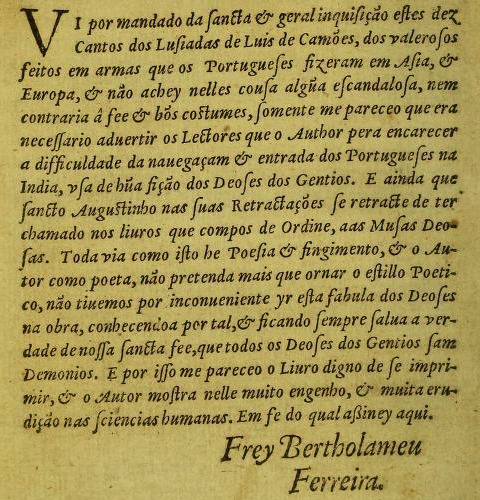What was the 16th century Catholic doctrine on Greek gods?
7
votes
1
answer
1495
views
I've long assumed the Catholics have always denied the existence of pagan gods, hence allowed them to be represented in art as a fiction reminiscent of a heroic and remote past. However, the strong wording in an addendum to the imprimatur (image below) for an early 1572 edition of the Portuguese epic Os Lusíadas from author Luiz de Camões states clearly that Greek gods referred to in the text are *demons* (Demonios).
This choice of words seems very strange to me. So, the question is: how did 16th century man and Catholic doctrine in particular see Greek/Roman gods? Did they acknowledge their existence as true demons who could bring evil or be invoked by a sorcerer? Or only figuratively in that worshiping a false deity would lead to distance from God and so opening space for demons to act?
 Source: [Os Lusiadas de Luis de Camões by Camões, Luís de, 1524?-1580](https://archive.org/details/oslusiadasdeluis00cam)
The text says: "By mandate of the Holy Inquisition, I have reviewed those ten chants [...] However, since this is a work of poetry and feigning, and the author, as a poet, has no further intentions than to follow the poetic style, we found no issue with the fable of foreign deities being told in this work. We know it as being such, and we *always keep the truth of our holy faith, that all Gods of the Gentiles are demons*. And so the book seems to me worthy of publishing and the author evinces in it his great genius and much learning in the human sciences. [...]"
Is this truth he alludes to is part of particularly strict contemporary views on mythology or is a point of doctrine?
Source: [Os Lusiadas de Luis de Camões by Camões, Luís de, 1524?-1580](https://archive.org/details/oslusiadasdeluis00cam)
The text says: "By mandate of the Holy Inquisition, I have reviewed those ten chants [...] However, since this is a work of poetry and feigning, and the author, as a poet, has no further intentions than to follow the poetic style, we found no issue with the fable of foreign deities being told in this work. We know it as being such, and we *always keep the truth of our holy faith, that all Gods of the Gentiles are demons*. And so the book seems to me worthy of publishing and the author evinces in it his great genius and much learning in the human sciences. [...]"
Is this truth he alludes to is part of particularly strict contemporary views on mythology or is a point of doctrine?
 Source: [Os Lusiadas de Luis de Camões by Camões, Luís de, 1524?-1580](https://archive.org/details/oslusiadasdeluis00cam)
The text says: "By mandate of the Holy Inquisition, I have reviewed those ten chants [...] However, since this is a work of poetry and feigning, and the author, as a poet, has no further intentions than to follow the poetic style, we found no issue with the fable of foreign deities being told in this work. We know it as being such, and we *always keep the truth of our holy faith, that all Gods of the Gentiles are demons*. And so the book seems to me worthy of publishing and the author evinces in it his great genius and much learning in the human sciences. [...]"
Is this truth he alludes to is part of particularly strict contemporary views on mythology or is a point of doctrine?
Source: [Os Lusiadas de Luis de Camões by Camões, Luís de, 1524?-1580](https://archive.org/details/oslusiadasdeluis00cam)
The text says: "By mandate of the Holy Inquisition, I have reviewed those ten chants [...] However, since this is a work of poetry and feigning, and the author, as a poet, has no further intentions than to follow the poetic style, we found no issue with the fable of foreign deities being told in this work. We know it as being such, and we *always keep the truth of our holy faith, that all Gods of the Gentiles are demons*. And so the book seems to me worthy of publishing and the author evinces in it his great genius and much learning in the human sciences. [...]"
Is this truth he alludes to is part of particularly strict contemporary views on mythology or is a point of doctrine?
Asked by exmachina
(171 rep)
Feb 17, 2019, 04:48 AM
Last activity: Feb 18, 2019, 09:00 PM
Last activity: Feb 18, 2019, 09:00 PM